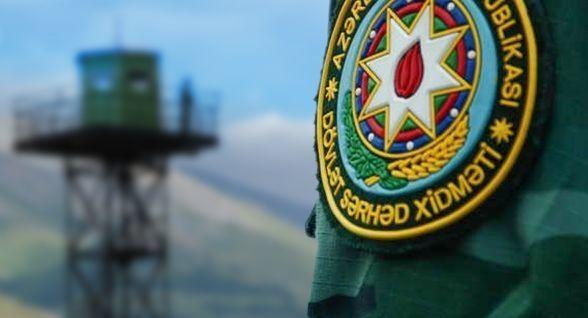Azerbaijan thwarts Armenian sabotage group attempt to cross border

By Vafa Ismayilova
An Armenian sabotage group attempted to cross the Azerbaijani-Armenian state border in liberated Zangilan region at about 1800 on April 23, the State Border Service has reported.
As a result of the measures taken, the penetration of the sabotage group into the Azerbaijani territory was prevented and the saboteurs were forced to retreat.
"The State Border Service regards this incident as a provocation by the Armenian side against the creation of delimitation commissions between countries and the corresponding work. Representatives of the Federal Border Service of the Russian Federation in Armenia have been informed about the provocation by the Armenian side. If this happens again, we will take more serious measures," the statement stressed.
On April 23 EU Council President Charles Michel contacted Azerbaijani President Ilham Aliyev to familiarize himself with steps taken in line with agreements reached with Armenia in Brussels on April 6.
Michel stressed the importance of tangible and results-oriented work in accordance with the agreements reached.
Aliyev thanked Michel for his support and continuous attention to the normalization of relations between Armenia and Azerbaijan, including the demarcation and delimitation of borders, preparation of a peace agreement between the two countries and the opening of transport and communication lines.
He noted that according to the Brussels meeting results, Azerbaijan had determined the composition of the national commission for the delimitation and demarcation of the Armenian-Azerbaijani border and a delegation to draft the peace agreement between the two countries, adding that Azerbaijan was ready for negotiations with Armenia in the “Baku-Yerevan” format. President Aliyev stressed the importance of taking into account the five principles presented by Azerbaijan for negotiations on a peace agreement.
Michel said he would continue his efforts to normalize Armenian-Azerbaijani relations and contribute to lasting peace in the South Caucasus region.
The intention of the European Union to support Azerbaijan in its mine-clearance efforts and the determination of the fate of about 4,000 Azerbaijanis who have been missing since the first Armenian-Azerbaijani war was praised during the phone conversation.
Earlier Aliyev stated that peace will return to the Caucasus based on the five principles Baku recently proposed for normalizing relations with Armenia.
He made the remarks during a meeting with Polish Foreign Minister, OSCE Chairman-in-Office Zbigniew Rau on March 31.
“The five principles we have initiated reflect the norms of international law and good international conduct... Reciprocal recognition of territorial integrity and inviolability of international borders, and then the delimitation of borders – I think that peace will come to the Caucasus on this basis. We want it,” he said.
The president emphasized that these principles are fundamental to any country's interstate relations.
“We are seeing the potential for active cooperation amongst the three countries of the South Caucasus, and I think that this will be important not only for these countries but also for the wider region,” he said.
The trilateral ceasefire deal signed by the Azerbaijani, Russian and Armenian leaders on November 10, 2020, ended the three-decade conflict over Azerbaijan’s Karabakh region which along with the seven adjacent regions came under the occupation of Armenian armed forces in the war in the early 1990s.
The deal also stipulated the return of Azerbaijan's Kalbajar, Aghdam and Lachin regions. Before the signing of the peace deal, Azerbaijan liberated 300 villages, settlements, city centers, and historic Shusha city that had been under Armenian occupation for about 30 years.
On January 11, 2021, the Azerbaijani, Russian and Armenian leaders signed the second statement since the end of the 44-day war. The newly-signed statement was set to implement clause 9 of the November 2020 statement related to the unblocking of all economic and transport communications in the region.
On November 26, 2021, the Azerbaijani, Russian and Armenian leaders signed a statement and agreed on a number of issues, including the demarcation and delimitation of the Azerbaijani-Armenian border by late 2021, some points related to humanitarian issues and the issue of unblocking of transport corridors which applies to the railway and to automobile communications.
On December 14, 2021, during the Brussels meeting, organized between Azerbaijani and Armenian leaders at the initiative of European Council President Charles Michel, the sides reaffirmed their commitment to the conditions agreed in the Sochi meeting.
Both sides agreed to establish a temporary working group on the delimitation of the Armenian-Azerbaijani border.
The issue of demining the liberated territories of Azerbaijan was also brought up on the agenda, and the European Union's readiness to provide technical assistance to Azerbaijan in this regard was underlined at the meeting.
--
Follow us on Twitter @AzerNewsAz
Here we are to serve you with news right now. It does not cost much, but worth your attention.
Choose to support open, independent, quality journalism and subscribe on a monthly basis.
By subscribing to our online newspaper, you can have full digital access to all news, analysis, and much more.
You can also follow AzerNEWS on Twitter @AzerNewsAz or Facebook @AzerNewsNewspaper
Thank you!
